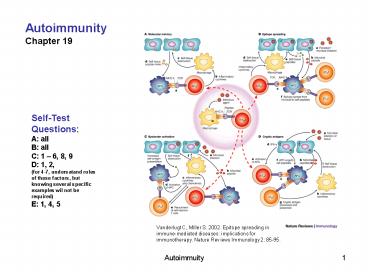Autoimmunity PowerPoint PPT Presentation
1 / 13
Title: Autoimmunity
1
Autoimmunity Chapter 19
Self-Test Questions A all B all C 1 6, 8,
9 D 1, 2, (for 4-7, undersatand roles of these
factors, but knowing several specific examples
wil not be required) E 1, 4, 5
Vanderlugt C, Miller S. 2002. Epitope spreading
in immune-mediated diseases implications for
immunotherapy. Nature Reviews Immunology 2 85-95.
2
What four events lead to onset of an autoimmune
disease? Auto-reactive T- and/or B- cells must
1. escape central tolerance 2. encounter
self-antigen 3. escape peripheral
tolerance -- most common immune system
failure 4. activate immune effectors that cause
cell damage To what extent do different Immune
mechanisms contribute? -- Variable Effector
mechanisms include hypersensitivities 1. Type II
-- ADCC 2. Type III immune complex
3
What are some triggers of autoimmunity? 1)
Inflammation 2) Infection 3) Trauma Warning
signals -- activate autoreactive cells --
bystander activation Superantigens --
polyclonal activation Exposure of cryptic
(sequestered) antigens -- Cell damage Abnormal
cytokine production -- Abnormal MHC expression
4
How can molecular mimicry lead to
autoimmunity? DC cell presentation to
TH Activation of CTLs Attack of self-Ag bearing
cells Cell-mediated most common -- due to
epitope spreading
5
How does epitope spreading cause auto-immune
against self-antigens? B-cells bind foreign
antigens -- Multisubunit complexes/ cell
fragments -- endocytosed and presented --
present multiple epitopes Activate TH cells --
with variety of TCRs
Adapted from Parson 2005 The Immune System 2nd ed
p 371
6
What are some predisposing factors? Genetic
predispositions HLA !!! non-HLA IM regulation
mutations -- failure of Tregs? Being
Female Hormonal influences Dietary
factors Chemicals etc..
X
7
Systemic Lupus Erythromatosus (SLE) -- system
tissue inflammation Etiology Immunology Immune
Complex deposition Type III Hyper ---
inflammation Anti-chromatin Abs and many
others Pathology and prognosis Widespread
vasculitis organ involvement Episodic Renal
disease Generally not life threatening Triggers
Risk Factors ??? -- exposure of cryptic AGs
(chromatin) C2 C4 (90) deficiencies HLA 90
women
Characteristic butterfly (Malar) rash, giving
the face a wolf-like appearance -- lupus is
Latin for wolf
8
Insulin Dependent (Type-I) Diabetes Mellitis --
loss of glucose homeostasis Etiology
Immunology Cell-mediated Beta-cells of
pancreas AG targets include insulin -- possibly
post-translationally modified Insulin
receptor and others Antibodies against these
proteins also form Pathology and
prognosis Islet cell destruction loss of insulin
production Triggers Risk Factors Molecular
mimicry viral infections HLA (DQa103
DQß10201) Abnormal MHC expression
9
Rheumatoid Arthritis (RA) -- Inflammation of
joint synovia Etiology Immunology Immune
Complex deposition etc Joint Synovia TH1-
induced IM-cell infiltration Rheumatoid Factor
(RF) Pathology and prognosis Episodic
flare-up Progressive joint deterioration RF
more severe symptoms Triggers Risk
Factors ??? abnormal Ig glycosylation HLA 75
women
10
Graves Disease -- most common cause of
hyperthyroidism Etiology Immunology Primarily
humoral IgG stimulating antibodies against
TSH -- and production of T3 T4 autoantibodies
against other thyroid proteins Hashimotos
disease -- most common cause of
hypothyroidism Etiology Immunology Primarily
cell-mediated IM-cell infiltration -- thyroid
cell apoptosis autoantibodies against thyroid
proteins ---------------------- Pathology and
prognosis Exophthalmos bulging eyes
Heat-intolerance (Graves) / Cold intolerance
(Hashi) Many other symptoms Triggers Risk
Factors ??? molecular mimicry HLA
11
Myasthenia Gravis -- Progressive muscular
weakening Etiology Immunology Primarily
Humoral 80 -- acetylcholine receptor Blocking
antibodies -- endocytosis or complement
Triggers Risk Factors HLA Thymus tumor,
rarely Pathology and prognosis Loss of muscle
control Initially of eyes mouth, throat Later
general eventually pulmonary Treatment can
restore near normal life
12
Multiple Sclerosis (MS) Etiology
Immunology Mainly cell mediated ??
humoral Myelin sheath demyelination Myelin
basic protein Only in CNS Pathology and
prognosis Relapsing and remitting Chronically
progressive in 30 of cases -- dementia --
loss of muscle function Triggers Risk
Factors Molecular mimicry HLA Abnormal MHC
expression Experimental Autoimmune
Encephalomyelitis (EAE) Inducible murine model
(MBP)
13
What are some immuno-therapies for AI
diseases? -- Largely experimental Disrupt
TCR-MHC complex -- monoclonal Abs against TCR,
MHC, CD3, CD28, CD40L, etc -- trigger anergy
clonal exhaustion Block cytokine receptors
Cytokine treatments Vaccines -- inject cloned
T-cells -- possibly elicit Tregs
Anti-TCR treatment of mouse EAE model

